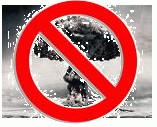Fukushima. Hiroshima. Nagasaki.
When we see or hear these words, anxiety becomes palpable. We remember back to March 11, 2011 and the reports of a radiation leak from the nuclear power plant following a tremendous earthquake and tsunami in Japan. Each day, the tension built as we listened to stories about how the plant's workers tried to limit the amount of radiation that escaped. Each day, there were conflicting stories about the dangerous consequences of the leaks, the effects of the radiation on the workers, on the ocean lapping alongside the plant, on locally grown foods and produce and on residents of the surrounding communities. The area of mandatory evacuation started out small and then grew almost daily. I wondered: Is there really any safe distance?
I wanted to believe that the radiation could be contained and that the melt down in the reactors could be stopped. I calmed down whenever any report sounded remotely positive, even while knowing that the chances were slim that the radiation could be contained. This went on for days following the tsunami. Suddenly, the talk stopped as life appeared to return to normal and discussion of the dangers of radiation poisoning ended as abruptly as it had begun, even though Japan's prime minister, Naoto Kan, called the Fukushima crisis the worst for Japan "since the Second World War."
Fast forward to July 2011, just a couple of weeks before the 66th anniversary of the dropping of the atomic bombs on Hiroshima and Nagasaki, August 6 and August 9, respectively. For New Jersey Peace Action (NJPA), these two dates have particular significance, as the organization began as NJ SANE (New Jersey Committee for a Sane Nuclear Policy) in response to the nuclear arms race between the United States and the former Soviet Union spawned by the deadly power of those two atomic bombs.
NJ SANE formed in response to a full page ad printed in the New York Times with the headline "We are facing a danger unlike any danger that has ever existed." What was that danger? It was the use and proliferation of nuclear weapons.
As Robert J. Lifton wrote in an April 19, 2011 article, "Fukushima is not Hiroshima; it is nuclear weapons that most endanger mankind."
For the past 54 years, NJPA has worked to ensure that no one forgets the dangers posed by nuclear weapons and to fill the information void left by the staggeringly short memory of U.S. media. No matter how you feel about the dropping of the atomic bombs on Japan in 1945, most people around the world agree that nuclear weapons are too deadly to be used again. When Little Boy was dropped on Hiroshima, nearly 140,000 people died instantly, with an estimated 200,000 additional deaths from radiation poisoning over the year. When Fat Man was dropped on Nagasaki, nearly 45,000 died instantly, with an estimated 70,000 dying from radiation poisoning before a year had passed. Unfortunately, it's difficult to know just how many more died from the after effects of radiation exposure.
It is tempting for us here in Bloomfield to think of both of these tragedies as having fallen on Japan and on Japan alone. But that does a disservice to ourselves and to the world. Every year for the past decade, NJPA has been fortunate enough to hear from Japanese survivors of the atomic bombings (Hibakusha) about the horror they witnessed and how their lives were changed forever. There is a 2nd and 3rd generation now Â? the children and grandchildren of the survivors Â? dedicated to attending international gatherings and conferences where they present the most persuasive case for the total world-wide elimination of nuclear weapons.
(Note: You can view every article as one long page if you sign up as an Advocate Member, or higher).





